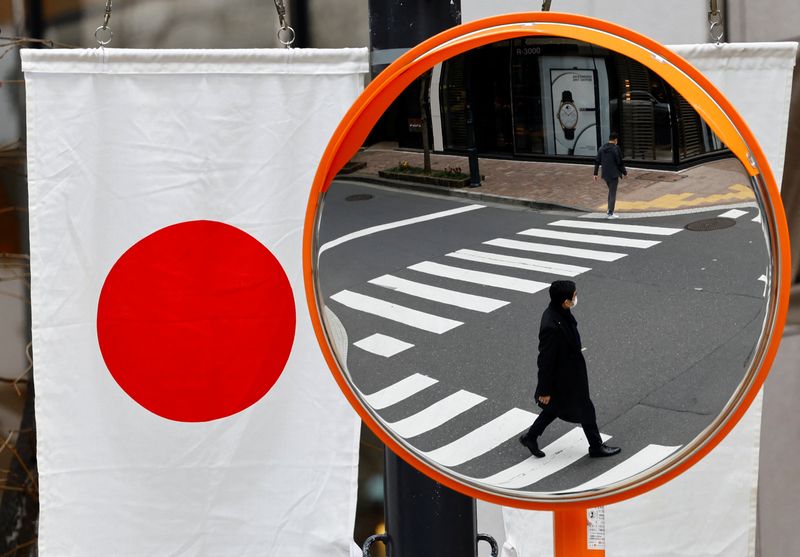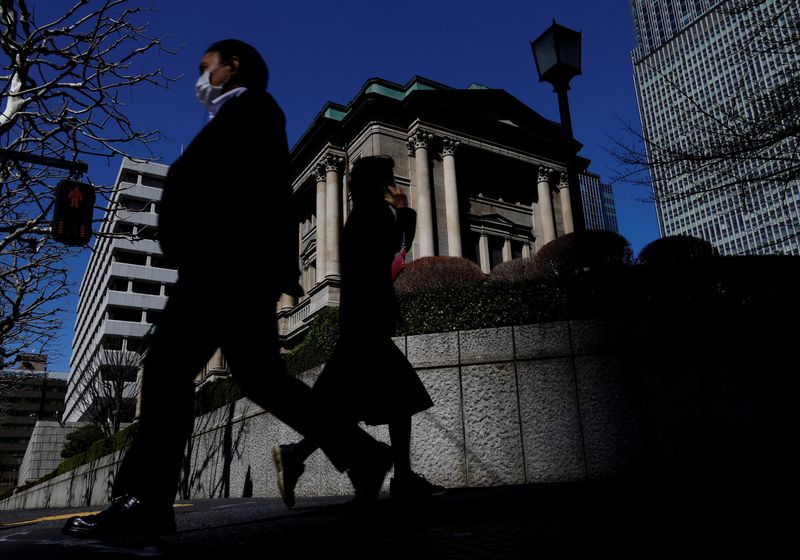(Reuters) - The Bank of Japan ended eight years of negative interest rates and other remnants of its unorthodox policy on Tuesday, making a historic shift away from a focus of reflating growth with decades of massive monetary stimulus.
COMMENTS:
ANDREW LILLEY, CHIEF RATES STRATEGIST, BARRENJOEY, SYDNEY
"The end of negative interest rate policy in Japan came not with a bang but with a whimper.
"In practical terms, I think if the 10-year JGB yield gets close to 1%, the Bank of Japan will continue buying as necessary and they still in practical terms will likely slow the increase in the 10-year JGB yield... Japan is so indebted, it cannot allow the 10-year yield to go much higher than 1%."
ATSUSHI TAKEDA, CHIEF ECONOMIST, ITOCHU ECONOMIC RESEARCH INSTITUTE
"The BOJ may be able to raise rates only once this year by 25 basis points and twice more next year, hoping to bring interest rates to its 2% inflation target down the road. But the pace of rate hikes will be much slower than those done by the US and Europe."
MA TIEYING, SENIOR ECONOMIST, DBS BANK, SINGAPORE
"The BOJ's next actions may involve further raising the policy rate beyond the 0.1% level and tapering/unwinding JGB purchases. These moves are unlikely to occur in the remainder of this year.
"Raising the policy rate above 0.1% would result in a direct rise in bank lending rates, impacting corporate and household borrowing costs. To do so, the BOJ will ensure sustained and stable 2% inflation, supported by macro wage growth exceeding 3%."
SHOKI OMORI, CHIEF JAPAN DESK STRATEGIST, MIZUHO SECURITIES, TOKYO
"We anticipate that the trend of a weaker yen will continue. The yen remains a funding currency and is likely to keep being utilised for carry trades.
"Surpassing 150 yen is quite conceivable, but a significant rise beyond that appears unlikely... It is doubtful financial authorities would allow a rise with such momentum. We believe it will hover around the 150 mark, and depending on the U.S. economy and interest rates, it may decrease."
RYUTARO KONO, CHIEF ECONOMIST, BNP PARIBAS SECURITIES
"There was no surprise. Having confirmed solid annual labour talks outcome, there was no reason for the BOJ to wait any further to make policy changes.
"I now expect the BOJ to raise rates every half a year through the end of next year, bringing interest rates to 0.75% by then, or it could fasten the pace of rate hikes by raising rates to 1% to the end of next year."
KYLE RODDA, SENIOR MARKETS ANALYST, CAPITAL.COM, MELBOURNE
"It was a fizzer for the record books. No major move in the markets. A paradoxical rally in the Nikkei and sell-off in the yen, although that's been unwound slightly.
"It's remarkable given a hike wasn't fully priced in. Long positioning in the yen was stretched going into the decision, so that might explain the whippy price action. We have to wait for the markets to digest the decision, especially as European and U.S. markets come on line."
HARUMI TAGUCHI, PRINCIPAL ECONOMIST, S&P GLOBAL MARKET INTELLIGENCE, TOKYO
"In principle, the BOJ must raise rates to secure room for potential rate cuts in case of a recession. But practically, the BOJ will only be able to start the rate hike, possibly to 0.25%, in the second half of 2025 if and only if the global economy remains robust and Japan's inflation keeps up with its target."
IZURU KATO, TOTAN RESEARCH, CHIEF ECONOMIST, TOKYO
"The BOJ started returning to normalisation but the bank's moves are quite carefully made and it is a baby step. I believe the BOJ is trying to convey such an image to avoid a spike in long-term yields.
"Although the BOJ judges it came in sight that the price stability target of 2% would be achieved, the central bank's views on the economy and prices have not turned bullish, which suggests another interest hike will not be so soon."
JAMES KNIVETON, SENIOR CORPORATE FX DEALER, CONVERA, MELBOURNE
"The Japanese central bank met market expectations of a return to normalcy today.
"Markets saw a weakening of the yen following the announcement, likely on a sell-the-fact theme.
"Interest rate differentials, while moving away from negative rates, still heavily favour the USD in the USD/JPY pair."
CHARU CHANANA, HEAD OF FX STRATEGY, SAXO, SINGAPORE
"Commentary suggests that they expect accommodative conditions to persist for some time, which is a signal that concurrent rate rises are unlikely. The yen, therefore, still remains a yield differential play, and the bigger part of closing the wide differential between US and Japanese yields will have to come from the Fed side rather than the BOJ.
BART WAKABAYASHI, TOKYO BRANCH MANAGER, STATE STREET
"It's a moment in history! But having said that, dollar/yen has only moved 30 points, so it's a classic 'buy the rumour, sell the fact'. I don't think the BOJ was going for the shock and awe approach this time.
"They are doing what they said they are going to do... essentially we're a normal country!
"How does this impact households locally and their spending power - I think that's going to be the next big discussion and with an eye to that I don't think the BOJ can do anything beyond what they've announced."
NORIHIRO YAMAGUCHI, SENIOR ECONOMIST, OXFORD ECONOMICS, TOKYO
"There were no surprises so far. It's all been in line with the market consensus, considering the multiple leaks seen in the local media lately.
"For the time being, I expect equity prices to increase with the uncertainty gone surrounding the meeting. The decision to maintain the ETF and REIT holding amounts could even be an upside surprise.
"Yields are likely to stay at current levels given that there were no surprises in the rate decision: YCC abolishment and continuation in QE."
DWYFOR EVANS, HEAD OF APAC MACRO STRATEGY, STATE STREET GLOBAL MARKETS, HONG KONG
"The Bank of Japan has finally adjusted its policy rate from negative to a 0-0.1% range, while scrapping yield curve control in a dual-pronged policy adjustment. As a concession to fears over a rise in long-term rates, the bank will continue JGB purchases in the same amounts as previously, although it acknowledged that short-term rates will be the primary policy tool. Continued JGB buying, ostensibly to cap yields, limits support for the Japanese yen, which remains sensitive to relative rates."
HIROFUMI SUZUKI, CHIEF FX STRATEGIST, SMBC, TOKYO
"As widely expected, the BOJ scrapped negative interest rate policy. It has also begun to normalise monetary policy, including by eliminating the YCC.
"The decision is undoubtedly a historic turning point. This means that the Japanese economy is entering an inflationary economy and that interest rates may be raised gradually in the near future."
FREDERIC NEUMANN, CHIEF ASIA ECONOMIST, HSBC, HONG KONG

"The BOJ today took its first, tentative step towards policy normalisation. The elimination of negative interest rates in particular signals the BOJ's confidence that Japan has emerged from the grip of deflation.
"Further tweaks to the BOJ's monetary policy, including the removal of yield curve control and amended guidelines for asset purchases, will have little direct impact on the central bank's monetary stance in the near term, but the moves signal a first step towards policy normalisation. The big question is what happens next. Likely, the BOJ will find that it is getting 'stuck at zero', being unable to lift short-term interest rates meaningfully further in the coming quarters."
